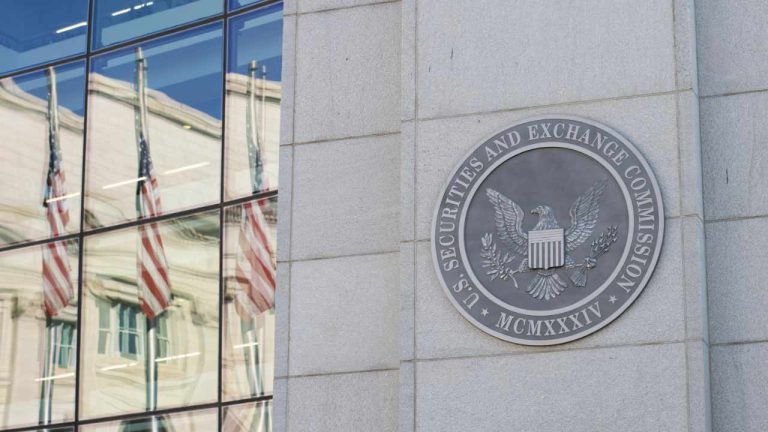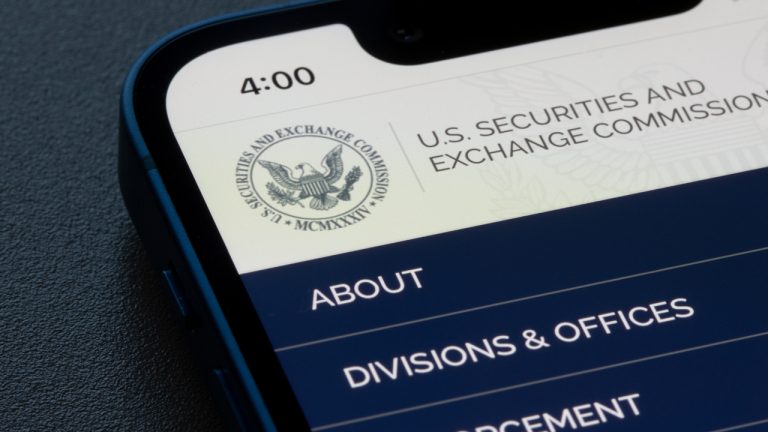
One of the biggest decentralized exchange (DEX) platforms says it is “fighting for DeFi” after receiving a Wells Notice from the U.S. Securities and Exchange Commission (SEC). In a new blog post, Uniswap (UNI) says it has recently received a Wells Notice from the SEC, meaning that the regulator is planning on taking enforcement actions […]
The post ‘Fighting for DeFi’: Top Decentralized Exchange Uniswap After Receiving Wells Notice From SEC appeared first on The Daily Hodl.

A Wells notice is a letter from the SEC indicating possible enforcement action against a person or a firm.
It is crucial to abide by all applicable laws and rules governing securities transactions and disclosures in order to prevent obtaining a Wells notice.
Businesses must also have a robust internal compliance program that regularly provides staff training on legal requirements and the potential repercussions of noncompliance. In order to assure accuracy and completeness, it is also crucial to undertake thorough assessments of all financial and operational disclosures on a regular basis.
Maintaining open and transparent communication with authorities, investors and other stakeholders is also crucial. This involves being timely in responding to any queries or worries expressed by regulatory bodies and proactive in disseminating pertinent information and updates.
Working with knowledgeable legal and financial experts who are aware of the regulatory environment and can offer advice on compliance issues is crucial. Individuals and organizations can lessen their chances of obtaining a Wells notice and safeguard themselves from potential enforcement action by following these steps.
While there are differences between Wells notices and subpoenas, both are important legal tools used in regulatory and legal investigations, and both should be taken seriously by the recipients.
A Wells notice is a notification of potential enforcement action, whereas a subpoena is a legal document that requires the recipient to produce documents, testify or provide other evidence in an investigation or legal proceeding.
In February 2023, a subpoena from the SEC was disclosed to have been received by trading platform Robinhood regarding Robinhood Crypto’s supported currencies, custody of cryptocurrencies and other platform operations.
Here are the differences between Wells notices and subpoenas:

Some general practices to consider when responding to a Wells notice include consulting with an attorney, reviewing the allegations and developing a strategy to respond, among others.
Getting a Wells notice can be a difficult and stressful process, so it is crucial to consult a qualified securities lawyer to get a legal defense. The best course of action can be decided after reviewing the allegations of wrongdoing with an attorney. To comprehend the SEC’s concerns and the information it has acquired, it is important to carefully read the allegations in the Wells notice and any accompanying documentation.
Work with the lawyer to create a response plan that addresses the accusations and makes a strong defense. This can entail compiling further proof or spotting holes in the SEC’s argument.
It is crucial to react to the Wells notice as soon as possible and by the SEC-set time. This demonstrates one’s willingness to take legal matters seriously and can lessen any potential civil penalty or fines.
Depending on the seriousness of the charges, it can be advantageous to take into account SEC settlement options, such as consenting to a cease-and-desist order or paying fines or penalties.
One should keep lines of communication open with a lawyer and the SEC employees involved in the matter at all times. By doing so, all parties involved can make sure they are well informed and identify any potential problems or obstacles.
While receiving a Wells notice does not necessarily mean that enforcement action will be taken, it is important to be prepared for potential outcomes and understand the potential implications for one’s investments or business operations.
A Wells notice is not a final determination of guilt or wrongdoing, meaning that the recipient has the chance to respond and make a case before any administrative action is initiated. The Wells notice procedure, though, is a clue that the SEC is considering taking action, and how it turns out might have a big impact on the recipient and any linked investors.
Consider the case where the SEC is looking into possible insider trading offenses at a publicly traded business. The SEC suspects that one of the company’s officials may have engaged in prohibited stock trading before a significant announcement was made based on non-public information.
The SEC would issue a Wells notice to the suspected employee in this situation, alerting the person to the inquiry against trading violations and giving the individual a chance to refute the charges before deciding whether to take enforcement action. So, what happens after a Wells notice is issued? Normally, the Wells notice would list the precise charges against the person and provide a deadline to reply to the SEC, as stated in the steps below.
Here’s how the Wells notice process typically works:
To ascertain whether there is sufficient justification for taking enforcement action, the SEC looks into potential violations of securities laws.
The SEC will issue a Wells notice to the person or business in question if it decides that there is enough proof of potential misconduct. The Wells notice will normally list the particular accusations and provide the addressee a chance to reply, known as a "Wells response.”
For instance, Coinbase received a Wells notice in March 2023 from the SEC, who identified potential securities law violations in relation to some of its listed digital assets, the Coinbase Earn staking service, Coinbase Prime and Coinbase Wallet. The SEC issued the Wells notice after conducting a preliminary investigation.
The Wells notice receiver may reply in writing or ask the SEC for a meeting in person to discuss the charges and give a defense. This response could contain arguments or supporting data to back up the defense, as well as any pertinent mitigating circumstances.
The SEC will decide whether to move further with enforcement action based on the response and any other data gathered. The SEC may file a complaint in federal court seeking fines or other remedies if it decides to pursue legal action or charges of securities fraud.
Investors should keep informed and consult with legal and financial experts to understand their options and possible risks because receiving a Wells notice can have major consequences for them.
A Wells notice is a formal notification from the Securities and Exchange Commission (SEC) that it is considering bringing enforcement action against an individual or entity. A Wells notice normally indicates that the SEC has completed an investigation and has discovered evidence of possible violations of the securities laws. But why is it called a Wells notice?
A Wells notice is named after John Wells, who was the SEC's general counsel from 1972 to 1976. Wells played a key role in creating the processes the SEC employs to launch enforcement actions against financial misconduct by people and businesses. The SEC adopted these procedures in 1972, giving them the names "Wells procedures" and "Wells notices."
So how serious is a Wells notice? Getting a Wells notice can worry investors because it implies that the business or person they invested in can be subject to legal action. A Wells notice, however, should be understood as an opportunity for the recipient to address the charges and make a case before the SEC decides whether to take enforcement action rather than as a final verdict of guilt or violation.
A Wells notice may impact investors in many ways — the price of the company’s stock or other securities may drop after receiving a Wells notification. Also, it can cause investors to become uncertain and concerned, which would impair their willingness to invest in the business or the overall market.
In rare circumstances, the resolution of a Wells notice may lead to fines, penalties or other sanctions being imposed against the involved company or person. These outcomes could significantly affect the company’s financial situation and future prospects, depending on the seriousness of the claimed infractions.
Related: What are the Howey test and its implications for cryptocurrency?
 A lawyer has explained why the U.S. Securities and Exchange Commission (SEC) will likely lose if the regulator takes crypto exchange Coinbase to court over alleged securities law violations. “The problem is entirely of Gary Gensler’s own making,” he stressed. Lawyer Expects SEC to Lose Against Coinbase in Court Lawyer James Murphy explained in a […]
A lawyer has explained why the U.S. Securities and Exchange Commission (SEC) will likely lose if the regulator takes crypto exchange Coinbase to court over alleged securities law violations. “The problem is entirely of Gary Gensler’s own making,” he stressed. Lawyer Expects SEC to Lose Against Coinbase in Court Lawyer James Murphy explained in a […]
Coinbase CEO Brian Armstrong called the quarter a "turning point" for the company as it worked towards a more "financially disciplined" firm.
Crypto exchange Coinbase managed to significantly narrow its net loss in the first quarter of 2023, due in part to robust earnings from retail investor trading activity.
The company’s net loss fell from $557 million in Q4 2022 to $79 million in Q1, partly attributed to a 22% increase in revenue to $736 million.
The results beat expectations from some analysts, leading to a 7% spike in Coinbase’s (COIN) share price in after hours trading.

Transaction revenue — derived from fees its charges for trades — from its institutional base increased a whopping 66% to over $22.3 million, while transaction revenue from retail investors increased14.1% to $352.1 million, according to Coinbase’s May 4 shareholder letter.
Overall, revenue from transactions increased 16% quarter-on-quarter to $375 million, though trading volumes remained fairly flat.
Interest income and blockchain rewards from staking brought in the most revenue for the quarter, which increased to $240.8 million and $73.7 million respectively from Q4 2022.
The percentage of revenue from Bitcoin (BTC) (36%) and Ether (ETH) (18%) trades remained almost identical over the quarter.
The firm is inching closer to profitability following a tumultuous 2022 which saw overall net losses of $1.16 billion, $803 million, $576 million and $605 million across each respective quarter last year.
Coinbase explained that the quarter represented a “turning point” towards building a more “efficient” and “financially disciplined” firm:
“We reduced costs, doubled down on operational excellence and risk management, and continue to drive product innovation and regulatory clarity. Our efforts are showing meaningful progress.”
“Our teams are smaller, but more nimble than ever and we are pleased with the pace of innovation and the results we are seeing,” the firm added.
Coinbase cut staff by 18% in June, 2022 and then another 20% in January, 2023 in order to ensure the firm maintains an appropriate level of “operational efficiency,” Armstrong explained.
Related: Coinbase International Exchange launches amid SEC crypto crackdown in the US
Coinbase’s comments were made in light of the Wells Notice hanging over their heads from the United States Securities Exchange Commission (SEC):
"We see this as an opportunity to continue pushing for a clear rule book in the US for crypto regulations."
The firm said it is "heartened" to see more bi-partisan support for incoming crypto legislation and hopes to play a role in advocating for a rules-based industry.
Magazine: Crypto regulation — Does SEC Chair Gary Gensler have the final say?
 On April 27, Coinbase, the crypto exchange based in San Francisco, made public the disclosure of its response to the Wells notice it had received from the U.S. Securities and Exchange Commission (SEC) back in March. The company maintained that the regulatory body’s enforcement actions were in direct contrast to the agency’s previous approval of […]
On April 27, Coinbase, the crypto exchange based in San Francisco, made public the disclosure of its response to the Wells notice it had received from the U.S. Securities and Exchange Commission (SEC) back in March. The company maintained that the regulatory body’s enforcement actions were in direct contrast to the agency’s previous approval of […]
Palihapitiya did concede the crypto sector has “pushed more boundaries” than other startup sectors, which may have attracted the SEC’s attention.
Regulators in the United States have choked out the cryptocurrency sector to the point of death, according to Bitcoin (BTC) bull and billionaire tech investor Chamath Palihapitiya.
“Crypto is dead in America,” he boldly claimed in an April 22 episode of the All-In podcast.
Palihapitiya’s comment came in response to the news that cryptocurrency exchange Coinbase is now considering a move offshore. He pointed the finger at Gary Gensler, the chair of the U.S. Securities Exchange Commission:
“Crypto is dead in America. I mean now you have Gensler even blaming the banking crisis on crypto — so the United States authorities have firmly pointed their guns at crypto.”
While Palihapitiya said that the U.S. likely views crypto as a threat to its “establishment,” the tech investor did however attribute some fault to the sector:
“In fairness to the regulators, [the crypto sector] did push the boundaries more than any other sector of the startup economy.”
He rounded out his analysis by concluding that the good actors are now “paying the price” for the bad work done by FTX and other firms that have impacted the reputation of the industry.
“The bill has come due for them,” he added.
David Sacks, one of the show’s co-hosts, said the U.S. may be trying to choke out crypto because it may eat into the dominance of the U.S. dollar:
“I think it’s probably not a coincidence that you’re seeing all these concerns about de-dollarization at the same time they're cracking down on crypto.”
But the overall impact will be a net negative one, implied Sacks, who is of the view that pushing crypto companies offshore will be “terrible for American innovation.”
Related: Coinbase CEO on its Wells notice: SEC is like soccer referees in a game of pickleball
Other commentators have described the issue at hand as “Operation Choke Point 2.0” — an alleged orchestrated effort by regulators to discourage banks from holding crypto or providing services to crypto companies.
Palihapitiya was baffled by the notion that Coinbase — a digital asset trading platform that he says had “played by the rules, stood in line” and “tried to do the right things” — was no closer to receiving regulatory clarity than the now-bankrupt FTX.
“How is that even possible,” Palihapitiya asked. Sacks answered that former FTX CEO Sam Bankman-Fried “had skills in gaming the system.”
In March, the SEC issued Coinbase a Wells notice — which typically implies the regulator plans on pursuing legal action against the firm for potential violations of U.S. securities laws.
If a lawsuit is filed, Coinbase CEO Brian Armstrong says that the exchange will be ready to litigate.
Magazine: Unstablecoins: Depegging, bank runs and other risks loom
 After the report revealing that the cryptocurrency exchange Bittrex had received a Wells Notice from the U.S. Securities and Exchange Commission (SEC), the securities regulator charged Bittrex and the company’s CEO on April 17 for “operating an unregistered exchange, broker, and clearing agency.” Following the Wells Notice, SEC Charges Bittrex for Violating Federal Laws On […]
After the report revealing that the cryptocurrency exchange Bittrex had received a Wells Notice from the U.S. Securities and Exchange Commission (SEC), the securities regulator charged Bittrex and the company’s CEO on April 17 for “operating an unregistered exchange, broker, and clearing agency.” Following the Wells Notice, SEC Charges Bittrex for Violating Federal Laws On […] According to a recent report, the cryptocurrency exchange Bittrex received a Wells notice from the U.S. Securities and Exchange Commission (SEC) in March, signaling a potential lawsuit. The SEC’s enforcement division sent the Wells notice prior to Bittrex deciding to wind down its operations in the United States. ‘Lack of Regulatory Clarity’ in the U.S. […]
According to a recent report, the cryptocurrency exchange Bittrex received a Wells notice from the U.S. Securities and Exchange Commission (SEC) in March, signaling a potential lawsuit. The SEC’s enforcement division sent the Wells notice prior to Bittrex deciding to wind down its operations in the United States. ‘Lack of Regulatory Clarity’ in the U.S. […]
Bitcoin’s strong start to 2023 is persisting despite numerous headwinds, and is currently outperforming the S&P 500 Index by nearly 60 percentage points.
Following Bitcoin’s (BTC) stellar start to 2023, SkyBridge Capital founder Anthony Scaramucci believes “we’re through the bear market” and expressed confidence in his firm's crypto investments.
However, "the Mooch" qualified the statement by adding, “That is a guess. We don't know.”
In an April 6 interview with Yahoo Finance, Scaramucci noted that Bitcoin has consistently outperformed every other asset class over longer periods of time, saying:
“But any time that you've held Bitcoin in a four-year rolling interval, so you pick the day, hold it for four years, you've outperformed every other asset class.”
Scaramacci also expressed his bullish outlook for the leading crypto by market cap ahead of the next halving cycle, which is set to take place in early March 2024 according to NiceHash.

Bitcoin has historically operated on a four-year cycle, with the start of an upwards trend occurring soon after each halving cycle.
The theory behind the price cycle is that block rewards being halved makes the BTC in existence more scarce, and therefore more valuable.
Bitcoin has recorded gains of nearly 70% in 2023 according to Cointelegraph Pro, increasing from $16,521 to $28,060 compared to the S&P 500 index rising by just over 7% during the same time period.
Bitcoin’s enviable start to 2023 also comes amid what can only be described as poor market and regulatory conditions that may yet weigh down the price.
Crypto institutions based in the United States are struggling to find banking partners and liquidity following the collapse of crypto-friendly banks such as Silvergate, Silicon Valley, and Signature Bank and there are fears that the U.S. is putting into place a policy to prevent banks from interacting with crypto.
Related: Bitcoin ‘faces headwinds’ as US money supply drops most since 1950s
Additionally, the two largest crypto exchanges in the world according to CoinMarketCap — Binance and Coinbase — have both been subject to recent scrutiny from regulators.
Coinbase received a Wells Notice on March 22 notifying of possible enforcement action from the Securities and Exchange Commission, while Binance has been sued by the Commodity Futures Trading Commission after allegedly violating trading and derivatives rules
Yet, despite these events, crypto sentiment remains positive.
The Crypto Fear & Greed Index, an indicator used to measure crypto sentiment, is currently sitting in greed territory and is pushing for highs that haven’t been seen since November 2021 — Bitcoin's all time high.

Asia Express: Zhu Su’s exchange did $13.64 in volume akshually, Huobi in crisis

While the U.S. government opts for “regulation by enforcement,” other countries are fostering “vibrant” crypto ecosystems due to progressive regulation, argues Coinbase’s Daniel Seifert.
With Coinbase seemingly on the verge of a court battle with the Securities and Exchange Commission (SEC), the firm has emphasized that the U.S. government’s hawkish approach to crypto regulation has “left a vacuum that other countries are eager to fill.’
The SEC issued Coinbase a wells notice on March 22 outlining that SEC staff had recommended the agency take enforcement action over “possible violations of securities laws” concerning some of the firm’s asset listings, staking services and Coinbase Wallet.
In a March 23 blog post titled Europe is winning. Will the US catch up? Daniel Seifert, Coinbase’s Vice President and Regional Managing Director in Europe, stressed that the U.S.’s “regulatory approach to crypto has been marked by regulation by enforcement,” despite industry-wide calls for “comprehensive crypto regulation.”
“This approach has created an environment of uncertainty and instability in the crypto industry,” he wrote.
Coinbase’s top lawyer @iampaulgrewal says the SEC wants court fights instead of conversation.
— Laura Shin (@laurashin) March 24, 2023
In dozens of meetings with the SEC over the last 9 months, Grewal says the exchange was “given essentially no response” to key questions.
Listen:https://t.co/027slXaMhb pic.twitter.com/L0ikJwleyA
As such, Seifert argued that the U.S. is losing its status as the leading hub of the crypto sector, while France, the U.K. and the European Union, are now building “vibrant” ecosystems due to their friendlier approach to crypto regulation.
“The US has left a vacuum that other countries are eager to fill,” he wrote, adding: “we are proudly an American company. It’s hard to sit by and watch the US squander the opportunity it has been given.”
The SEC misses one of the biggest frauds in history - FTX/Alameda
— sassal.eth (@sassal0x) March 23, 2023
Gary Gensler cozies up to the head of that fraud - SBF
And then the SEC goes after the most legitimate company in crypto - Coinbase
Yes yes very normal and totally rational
In particular, Seifert highlighted the significance of the Blockchain Week event being hosted at the Louvre in Paris this month. He also pointed to the U.K.’s recent push to become a crypto hub, and the European Union’s Markets in Crypto-Assets (MiCA) regulation that is slated to come into effect in 2024.
“This year it’s being held in a private space at the Louvre, arguably the greatest national treasure in France and one of the world’s most respected museums,” he said, adding:
“To me this is a clear signal: France is rapidly recognizing the opportunity that crypto presents and is offering it space to flourish. The broader EU, the UK, UAE, Hong Kong, Singapore, Australia, and Japan are all following suit.”
The MiCA legislation has been in development for two years, and aims to establish a “harmonized set of rules for crypto-assets and related activities and services.”
Related: Cathie Wood’s ARK loading up on Coinbase shares again, buying $18M
It is generally expected to be a positive move for the European cryptocurrency ecosystem, as it will offer clear rules and guidelines for the sector.
“Already we are seeing that Europe now matches the US in its share of crypto developers ( 29% apiece globally). The US used to lead the charge with 40%,” he said, adding that:
“This level of growth does not happen by chance. Concerted efforts have to be made, such as developing a regulatory framework that will provide clarity and stability for businesses operating in the space.”
In a lengthy March 23 Twitter thread, the Crypto Council for Innovation also highlighted similar points to Seifert, noting that “crypto is global, and nobody is waiting around for the US to land the plane.”
1/ Crypto is global, and nobody is waiting around for the US to land the plane. Here, our roundup of global activity ():
— Crypto Council for Innovation (@crypto_council) March 24, 2023
The thread explored positive developments across the globe, including examples such as the National Australia Bank’s work with non-USD pegged stablecoins, Hong Kong’s efforts to become a digital asset hub, and the Canadian Securities Administration recently imposing "enhanced investor protection commitments" on domestic crypto exchanges.